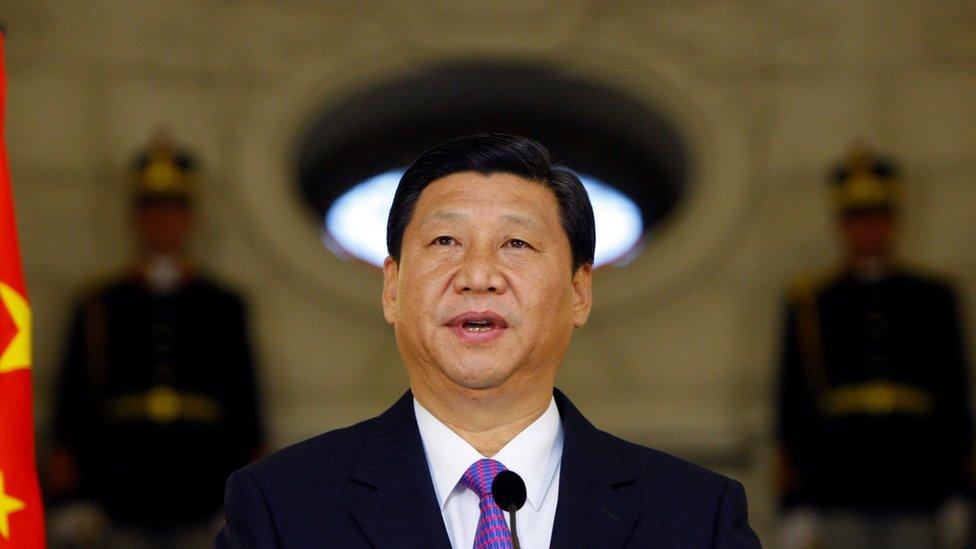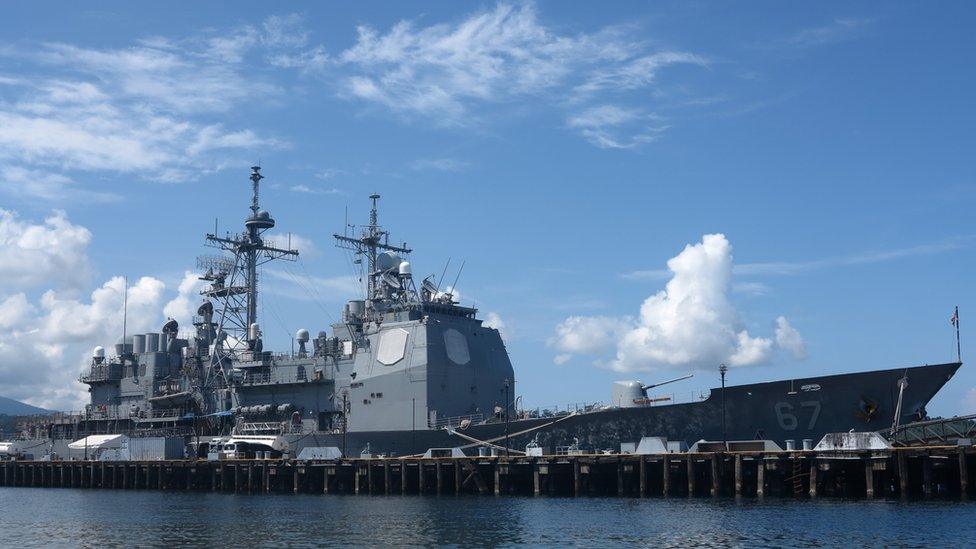Trump Xi meeting: An A-Z of the big issues
- Published
- comments
What American and Chinese people want
US President Donald Trump will host his Chinese counterpart, Xi Jinping, for two days of talks in Mar-a-Lago, Florida. From trade to currency to North Korea, a lot is on the table for the leaders of the world's two largest economies. Will they have time for some golf?


As in alpha males. At a fraught moment in history, the world's two biggest economies are led by two macho men about to meet on a blind date. A could also be for the anxiety this unpredictable encounter provokes among policymakers on both sides, especially in a Chinese presidential team which hates surprises.


President Trump has done a lot of rhetorical China bashing. But at this summit the contours of a real US China policy must start to appear. Was all Mr Trump's campaign talk of winning against China just sound and fury signifying nothing or was it a muscular new policy in the making?


President Trump has repeatedly accused China of being a master manipulator of its currency. Many economists say it was once but isn't now. For the past two years China has been selling its reserves to keep the value of its currency up rather than driving it down to boost exports. In Florida, will President Trump call President Xi a currency manipulator to his face or will he pick a different battle?
Read more: The risks and benefits of China weakening its currency


What will this summit actually deliver? Nearly half the US trade deficit is with China and this week President Trump said again the US "cannot continue to trade if we are going to have an unfair deal like we have right now". But in his lexicon, D is also for difficult. He has warned that the summit with President Xi will be exactly that, which is perhaps a way of managing expectations down towards Ds for disappointment and deterioration. Some pessimists warn that the most this summit can deliver is greater predictability in a stressed and uncertain relationship. Other pessimists say those pessimists are already too optimistic, that this summit is premature because President Trump doesn't even have a China team let alone a coherent China policy. But those pessimists are in the American camp. For China, US incoherence is a source of optimism.


And US employment. President Xi must convince his host that China offers solutions for both if he wants to keep US markets open to Chinese goods.


President Trump is giving President Xi plenty of it by inviting him to his private Florida resort. That's meaningful to a status conscious Chinese audience at home. If Mr Trump can refrain from tarnishing the gift by some unforeseen slight or offence, optimists say he may get a calculated concession on North Korea or trade in return.


Because President Xi disapproves of a game played back home between tycoons and corrupt Communist Party officials. Instead G is for globalisation of which the Chinese president now likes to see himself the champion. Along with efforts to tackle climate change. Expect subtle Chinese allusions to President Trump's retreat from both.


It's supposed to be a gesture of peace and its absence would send the wrong signal, but President Xi has his own version of this ritual and will not want to submit to the much studied Trump grab and yank. Watch for a hybrid handshake.


Ivanka Trump, The soft power weapon of the Trump administration in China. Opinions divide on the father, but the daughter is a source of fascination to many young Chinese, and when relations between the incoming Trump administration and Beijing were at their nadir following the president elect's phone call with the Taiwanese president, it was Ivanka who kept lines of communication open with her attendance at a Chinese new year embassy function in Washington.


Jared Kushner, Ivanka's husband, has also established a good relationship with China's top diplomats in the US. At 36 and with no previous government experience, President Trump's son-in-law has become a key channel of communication between the White House and Beijing. But he's a novice on the most complex bilateral relationship in the world, and until last week his family's real estate business was pursuing a significant investment from a politically connected Chinese company. Those negotiations have now been suspended amid suggestions of a potential conflict of interest, but some observers still worry that he may be vulnerable to China's master negotiators and mistake a short-term gain for long-term US advantage.


The leader of North Korea managed to overshadow a visit to Asia last month by the new US Secretary of State Rex Tillerson. On that occasion it was the carefully timed announcement of a new rocket engine. No one is in any doubt that North Korea's bid for nuclear missiles which can reach American soil will loom large over this summit. But to prevent the world's inattention even for a moment, Kim Jong-un test fired a missile on the eve of President Xi's arrival in Florida.


And the lower key presence of the first ladies Melania Trump and Peng Liyuan. As fashion model and folk singer respectively, both were familiar with the limelight long before their famous marriages. It will be interesting to watch the first ladies attempt to engage without upstaging the husbands.


For all President Xi's fine talk of openness and globalisation, the US market is currently open to Chinese goods and services in a way that China's is not. Beijing has repeatedly promised to remove import barriers, and as this is in the interests of China's long term growth, there really ought to be room for progress here.


President Trump will have to avoid shouting, sulking and abuse. Chinese protocol will simply not tolerate it.


The slogans that China likes: "One China" and "One Belt, One Road". The former is the formulation which frames a fragile US-China understanding on how to avoid going to war over Taiwan. The latter is China's massive infrastructure and development initiative for Asia. After initially threatening to re-examine relations with Taiwan, President Trump committed to the "One China Policy" in a phone call with President Xi in February. But there is no fixed US position on "One Belt, One Road" and President Trump is highly unlikely to sign up to President Xi's other favourite slogan the 'new model of great power relations' by which China signals its hopes for an Asian sphere of influence.


The American ghost at the summit feast. The pivot to Asia was the slogan of the first Obama administration eight years ago, a vision of a United States firmly embedded in Asia with the Trans Pacific Partnership trade agreement underpinning a mesh of American security alliances. In Mr Obama's second term, the pivot to Asia was rebranded the rebalance, but with President Trump's decision to walk away from TPP, both pivot and rebalance are history. Even some US security alliances in Asia are looking less than solid in face of the rise of China and its vigorous cheque book diplomacy. If President Trump wants to hang onto allies like the Philippines and Thailand he urgently needs an Asia policy as well as a China policy. In fact, it's hard to define the latter without the former.


The Trump administration talks tough on China, but when it comes to actually engaging, it is in the same quandary as every previous US administration since the US and China restored diplomatic relations four decades ago - how to exert leverage on Beijing without damaging itself or its allies.


But also for rivalry and risk. In just a few brief hours together over a dinner and a lunch, can the two presidents build enough personal rapport to cut through the strategic rivalry and mistrust which risk the future of the world's most important bilateral relationship?


The South China Sea. President Trump does not want to accept China's audacious island-building and militarisation as a fait accompli but President Xi will certainly not back down to a summit threat. And if the new US president is silent on the subject of the South China Sea, some allies may see it as a signal of willingness to surrender control of these vital waters to Beijing. So what to say about the South China Sea?


And tariffs and Twitter. And also for Thucydides Trap, the theory that a rising power causes fear in an established power which then escalates toward war. Xi Jinping actually discussed the Thucydides trap at the 2015 summit with Barack Obama. On that occasion, there was no agreement on how to avoid it. Most would agree that the rise of the rising power and the fear of the established power have only increased in the interim.
What are the contentious issues around US-China trade?


This week President Trump said the US would solve the problem of a nuclear North Korea on its own if China was unwilling to help. In the first instance, dealing with the problem may mean secondary sanctions on Chinese companies and individuals who trade with North Korea. And as a last resort, it may mean the threat of pre-emptive US military action against Pyongyang. It's a discussion which will get President Xi's full attention but it seems unlikely that he and his host can agree on what constitutes Chinese "help with North Korea" let alone how much of it would be enough.


US presidents often use summits to remind their Chinese communist counterparts of the virtues of democracy, human rights and freedom. But President Trump may choose to remain silent on values.


The new US secretary of state gratified President Xi last month when on a visit to Beijing. He used the Chinese formulation "non-conflict, non-confrontation, mutual respect and win-win cooperation" to describe US-China ties. President Xi would dearly love to hear President Trump echo this language. Despite all the name calling from Mr Trump over the past year, the Chinese president and his state-controlled media have stuck to mild appeals to reason and common interest in framing the US-China narrative. Vanilla is President Xi's favourite flavour here and if he can persuade President Trump to tweet bland he will call it a triumph.


At home, the Chinese president is in the sensitive run up to a Communist Party Congress at which he wants to install key allies in top positions. The last thing he needs is a trade war with a vital export market, especially as China's economic growth is slowing. A standoff in the South China Sea or on the Korean peninsula would be even worse. President Xi needs his relationship with President Trump to work. And he needs to go home calling this summit a success.


… hmmm… not sure. Any suggestions?


As in zero sum game. If President Trump takes a zero sum attitude towards the US trade balance with China, and if President Xi takes a zero sum attitude towards the US role in Asia then their summitry will swiftly sour and all talk of winners will look hollow.
- Published24 February 2017
- Published29 October 2016

- Published28 October 2016
- Published7 July 2023

